Please
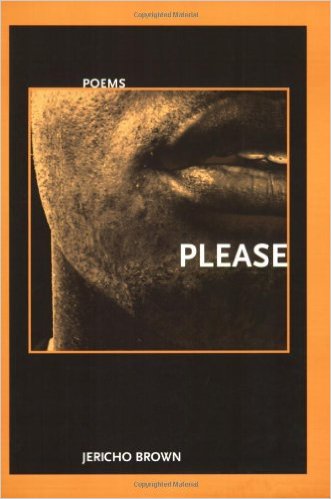
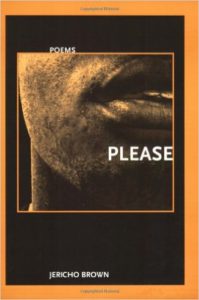 by Jericho Brown,
by Jericho Brown,
Western Michigan University, 2008,
69 pages, paper, $14.00,
ISBN–10: 1–930974–79–5
Buy the Book
In the same way that music hits you straight in the heart, the solar plexus, the guts, Jericho Brown’s poems in Please take direct aim. The poems in this stunning first collection by this talented new poet are risky, beautifully crafted, and deeply felt. At times while reading it, I found myself gasping, or humming, or simply struck profoundly by the emotions.
Please explores the intersection of life where love and violence intermingle. In this exploration, Brown uses the framework of music to spotlight moments in history and culture that surround African American /male identity and sexuality. The use of music works on many levels in this book. The overall organization of the book is that of an album or CD, complete with poems mimicking musical tracks and liner notes at the end.
The sections of the book also reflect a CD player or iPod: “Repeat,” “Pause,” “Power,” and “Stop.” (“Stop” is not an actual section with poems in it, but simply a direction.) And the language itself in the individual poems is lyrical, all adding up to the book’s compelling strength.
Under the umbrella of the musical structure, several themes weave themselves throughout this work: family, love in its many forms, and violence or hurt. While these are not new themes in poetry, Brown’s treatment of them through the lenses of race, culture, and a myriad of voices and points of view give the work a freshness and muscularity.
We hear the voices of various R&B and pop singers such as Diana Ross (“Track 4: Reflections” 11), and Janis Joplin, (“Track 5: Summertime” 19). But besides giving us the voices of the singer, Brown also gives us historical context, as in the Track 4: Reflections Diana Ross poem:
I could hear the sun sing in 1968.
I learned the word assassin
And watched cities burn.
Got another #1 and somebody
Set Detroit on fire. That was power —
White folks looking at me
Directly and going blind
We also hear the voices of grandmothers, fathers, sons, and even crickets and burning bushes. In each of the three sections, Brown also includes the Wizard of Oz’s three famous travelling companions, the scarecrow, tin man, and lion. We hear the voices of the African American culture, of what it’s like to be a gay man growing up and the anguish and violence associated with that.
Complex emotions intertwine throughout the book. In “Prayer of the Backhanded” (8), which appears near the beginning of the book, it describes abuse:
Father, I bear the bridge
Of what might have been
A broken nose. I lift to you
What was a busted lip.
Then near the end, another poem “Like Father” describes the coming out experience:
My father’s embrace is tighter
Now that he knows
He is not the only man in my life.
The poems are gritty, hypnotic, and dangerous, all of which makes these poems incredibly satisfying to read. It is clear that throughout the book, the author’s intention was not to hold anything back. In an interview in Critical Mass, the blog of the National Book Critic’s Circle Board of Directors, Brown articulates this intention. “My only goal is to write poems that take risks in their form and their content. I have always been attracted to work that manages to say what may be thought unsayable, poems that make clear the vulnerability of the poet to his or her work.”
The Jan/Feb 2009 edition of Poets & Writers Jericho Brown is highlighted among 12 debut poets of 2008. At only 25 years old, he’s worth watching, paying attention to, and especially, reading.
— Michelle Demers
A Darker, Sweeter String
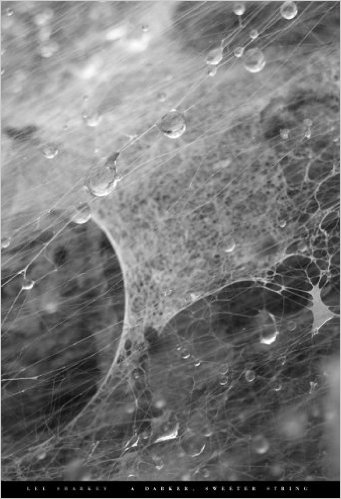
 by Lee Sharkey,
by Lee Sharkey,
Weld: Off the Grid Press, 2009,
96 pages, $15.00,
ISBN–10: 0–9778429–1–6, ISBN–13: 978–09778429–1–9
Buy the Book
When I think about Lee Sharkey’s A Darker, Sweeter String, the word that comes to mind is liminal. The poems, again and again, occupy that bewildering space between then and now, between present and future, populating the shifting temporal landscape with their characters and critters. Voices seem to speak from these places as an attempt to mark time, the way folding the corner of the page marks my place in the book. The poems themselves also reveal, however, that time cannot be kept in this way. In Sharkey’s poems, deliberate movement from past to present to future is simultaneously enacted and made impossible, not by some fixed boundary, but by the nature of time as Sharkey paints it: layered, the past always a painful pentimento.
In “Where the raven was,” for example, objects and animals — milk, a raven, a stream — mark out the landscape, attempting to delineate a physical and temporal space: “There is a stream there is milk there is a raven / There is a stream of milk there is where the raven was / There was milk there was a stream.” As objects compete to occupy the same spot in time, verb tense shifts — sometimes the milk is and sometimes it was, located in the same space as the stream or where the stream was, but Sharkey goes on to write, “By the stream always it is now,” making the assertion of this past tense deliberately questionable.
Lest we regard the poem — or the book at large — as mere theoretical exercise, Sharkey shows us quickly and clearly what’s at stake, nothing less than “the dead child forever leaving / The new child arriving in a pod of milk.” Perhaps the most accurate and searing revelation here is that if, by the stream, it is always “now,” milk is eternal, but so is loss. In the poem’s final lines, Sharkey writes, “Where the raven was there was a stream the milk was stolen / The stream spills over every body floats.” “Every body” is, here, floating in a stream no longer present, possibly a stream of stolen milk, making stream and milk once more abundant in the current moment, restoring a thing taken through violence and simultaneously — by an act as simple as making “every body” two words — giving the lie to the very notion of restoration.
As evident in “Where the raven was,” with its continuous repetition and revision, Sharkey is thrillingly experimental in A Darker, Sweeter String, arriving at something heartbreaking and necessary by following her own wordplay with what appears a brave and abiding faith. Just as striking are the book’s plain–spoken lines, its disarming moments of pure lucidity. In “Obviously dead,” Sharkey tells us “This is a house where no one owns her body,” and I think she means this house, the one we are living in, where “not a ligament but comes undone.” We are always both the dead child leaving and the new child arriving. When Sharkey writes of “the ghost who’s hungry” leaning in to sip from the lips of the living, I can’t help thinking that we are the hungry ghosts sipping from our own lips, stealing our own milk all the time as moments slip from us, irretrievable, each one swallowed by the next. As a reader, I am simultaneously seduced and unnerved by Sharkey’s strange and ferocious honesty.
There are moments of comfort, though even here Sharkey’s vision is uncompromising. In the love poem “By Moonlight,” the speaker begins by insisting, “One of us will leave the other sure enough / while one of us disintegrates to never having been,” but the poem ends with these lines: “whoever holds the dying other / will inhale one last time in unison // both of us will listen / to the green incessant wind.” And in the long poem “Unscripted,” the speaker intones, “Blessed art thou / suspirer of the Universe / wingbreaker / healer of wings.” The voice here is one of ferocity and tenderness, and it addresses a world that mirrors this mixture of apparently incongruous qualities — the world in which we give birth to sons and watch them die — of disease or in war — and while Sharkey never shies away from this searing truth, there is never a note of resignation in The Darker, Sweeter String. We are never tempted, either, to believe that the layered time she creates in the book — the “always now” — renders the past and future meaningless. This is the true magic, for me — that Sharkey collapses time without ever becoming a historical — history matters all the more in this book for the way in which it infuses this very moment, the future we are making right now a ghost sipping from our lips. Because Sharkey is willing to take enormous risks, both in terms of content and in terms of style, she creates something that is often breathtaking, frightening, and — yes — sweet.
— Melissa M. Crowe
Crucifixion in the Plaza de Armas
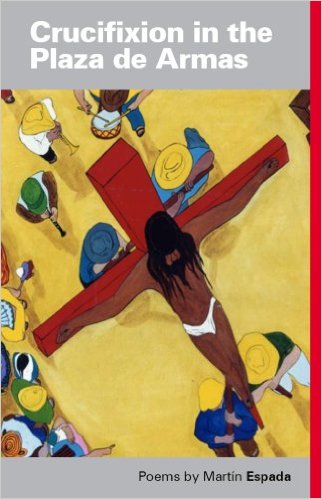
 by Martin Espada,
by Martin Espada,
Smokestack Books, 2008,
66 pages, paper, $7.95,
ISBN: 978–0–9554028–1–4
Buy the Book
Whether the Ponce uprising, or Rosa Park’s simple act of remaining in her bus seat, it seems every rebellion takes on its own momentum and personality. Crucifixion in the Plaza de Armas by Martin Espada, is a book of courage, beauty, tribute, and rebellion. Espada says, “. . . rebellion / is the circle of a lover’s hands / that must keep moving / always weaving.” (51) Puerto Rico’s people and heritage is palpable in Espada’s work, his gritty voice folding a culture textured with slavery and foreign occupation into the faces and voices of Puerto Rico’s ordinary and extraordinary heroes, many his family.
In 1898, during the Spanish American War, the USA invaded Puerto Rico and never left. Martin Espada is an “independentista” (7); a group who believes in a free Puerto Rico from USA “occupation,” and his poems of Puerto Rico’s persecution resonate like a clanging bell calling us in from the school yard for a history lesson to examine our own behavior. With incredible clarity and example, Espada shows the struggle for freedom and the brokenness that struggle creates, both politically and personally. These two characteristics he cannot separate. Love and rebellion may sound like the antithesis of each other, but not here, not in this work.
Espada paints the invisible bars visible around a still captured Puerto Rico. In The Lover of a Subversive is Also a Subversive (55), Espada shows it best: “When the beach chilled cold / and the bright stumble of tourists / deserted, she and the FBI man / were left alone with their spying glances /as he waited calmly / for the sobbing to begin / and she refused to sob.” (56) His political tribute to Nationalist poet Clemente Soto Velez in the poem “Hands without Irons Become Dragonflies,” (59) a long, passionate poem, somewhat didactic in nature, gives poignant background to Puerto Rico’s history of rebellion.
In 2008, while visiting Tuamgraney, County Clare, Ireland, I walked around graveyards full of Celtic crosses and generations of O’Grady’s; my people, my heritage pulled from the arms of Ireland under British occupation. I was amazed how strong my reactions were visiting this land where names and customs were kept alive by my family in Pittston, Maine five generations past the “Great Hunger.” Evolution might well have changed the curve of our backbone, but not the curve of our human nature.
I felt an unexpected sense of beginning and belonging; and yes, resentment when being introduced to an English owner of pristine Irish coastline overlooking the spectacular Ring of Kerry. For a nanosecond, I felt unexpected ire, remembering that we lost our land and heritage enslaved in our own land, too. Can occupation and persecution pervade the very soul of a collective people? I can hear “James Connolly bellowing insurrection to the Citizen Army of Ireland” (48) shout a resounding “yes!”
Espada’s poems are rich word–portraits of the Puerto Rico people and the culture covering them: the religion, coffee–bean brown land, the lush smell of papaya, and those displaced to Carolina, or New York City, dreaming of mountains and puff–cloud skies. In a poem for his father Frank Espada, he writes of how he, “. . . saw the mountains / looming above the projects / overwhelming Brooklyn / living by what I saw at night / with my eyes closed.” (14) Espada’s poems create a collage of face and place that is sometimes transparent, lost or clearly displaced, yet strong even in its changing. He throws a patchwork quilt over these pages as he allows each name of town, person, image, event to become his country.
In The Rage of Plantation Days, one finds the same vivid imagery and emotive language typical of his work, “Utuado at nightfall / darkness the ink of an octopus / staining the sky between mountains / . . . the shouting over money or a woman /. . . lamp splintered by machete . . .” Espada shows us bodies dragged through the plaza . . .” and a boy / with a broom on the church steps / who once sobbed when he killed a lizard, watching.” (18) This is such a vivid, and unfortunately universal, image; the loss of innocence through violence.
Perhaps the book cover “Dias de Cristo” by Frank Dias Escalet best explains Espada’s passion to stand free. The cover is a black Christ hanging in a central plaza courtyard of de Armas (weapons). Under the cross, gay sombreros and children, festive donkey carts and trumpeters go about their daily business of life in a celebration, while their black Christ suffers their destiny above them, both past and future. Poems in the collection repeatedly call out in one way or another, that “this stripped and starving earth is not a grave” (59), yet Espada’s quest to separate as a country, body and soul is pervasive. He even extends this separation to the persona of Christ; the black Christ of Puerto Rico and the white one the Yankee’s brought. It’s as if, by the single power of his words, he can keep Puerto Rico’s core identity from dispersing and blowing off into the winds.
— Claire Hersom
An Apron Full of Beans: New and Selected Poems
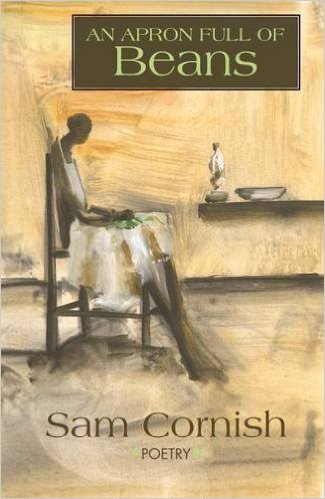
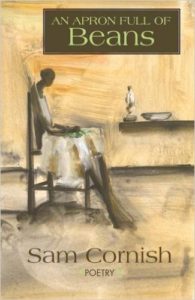 by Sam Cornish,
by Sam Cornish,
CavanKerry Press Ltd., 2008,
179 pages, paper, $16.00,
ISBN: 978–1–933880–09–9
Purchase Book
As the first Poet Laureate of the City of Boston and the author of six previous volumes of verse — in addition to his many other honors and awards — it is surprising, indeed, that Sam Cornish is occasionally omitted from the discussion of the Black Arts Movement, as his voice is just as resonant and sincere as any of his contemporaries. Thankfully, his new and selected poems An Apron Full of Beans is a splendidly comprehensive and eclectic collection, which not only affirms Cornish’s role in the American poetry of the previous century, but also demonstrates the raw force of his work today, here, in the electric pulse of now.
In his brief yet poignant introduction to this collection, Dr. James E. Smethurst argues that Cornish’s poems are remarkable for their distillation of so many period styles — particularly those of the Beats, the Black Arts Movement, and the Black Mountain School — yet remain distinct, complete, and authentic in their rhythms and sense of language. It is a point worth repeating. Cornish is just as comfortable with the short, terse lyric as he is with that wild animal called the prose poem, as we see in the collection’s moving final inclusion, “Elegy,” and it is rare that one feels the dust of age upon the older poems in the book.
Another striking quality of Cornish’s poems is the depth of craft they display page after page. There are plenty of poems here that reveal Cornish’s adept skill with necktie–skinny narratives full of plain–spoken, enjambed diction running twenty lines or fewer, such as the clipped minimalism of “Ebony:”
My father labored
in the mine his
hands blacker than
his face
face as black
as
coal his hands
darkest
coal dust
my mother
a fair skinned
woman former
schoolteacher
worked at home
read the Bible
and prayed &
I became
a Communist
But the deeper one gets inside Cornish’s universe of barbershops, broken families, and runaway slaves riding the rails of hope, we see that this style is a conscious commitment to form rather than the result of a limited range. This clearly evident in Cornish’s longer poems, such as “Woman in a Red Dress,” which shed their colloquialism and understatement for a denser, more lyrical register: “If she could count past her fingers / About her body / The words she would find / If she could read / She gathers
water / Like sounds in her head / She kneels / Like a slave / In church / Like a slave preparing / To dance . . .”
While the jacket flap for An Apron Full of Beans claims the collection is “an African–American sequel to Walt Whitman’s Leaves of Grass,” one wonders if such a conceptual framework is applicable or even necessary. Time and again in these poems, Sam Cornish trespasses the accepted borders between public history and private experience by evoking the voices of slaves, sharecroppers, and historical figures such as Frederick Douglass in one large cultural conversation that is self–sustaining without the added burden of arguing against Whitman’s vision of nationhood. Moreover, the questions that result about race, power, love, and loss are more relevant in this strange new century of ours as they’ve ever been. Some of the best voices in America today, such as Kevin Young, Natasha Trethewey, and A. Van Jordan are following in the footsteps of Cornish not merely because he is an indispensible African–American voice, but because he has the courage to turn his interrogative gaze upon our savage and beautiful past without casting his eyes away. Ultimately, though, An Apron Full of Beans doesn’t belong on your bookshelf as a relic of inspiration. It just belongs on your bookshelf.
— Adam Tavel


